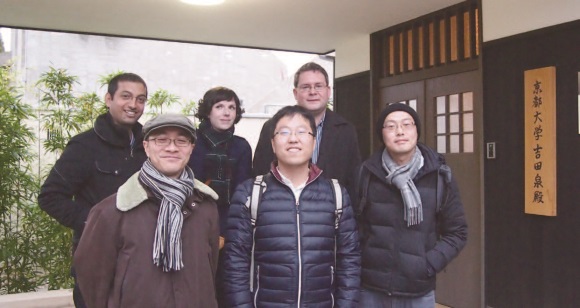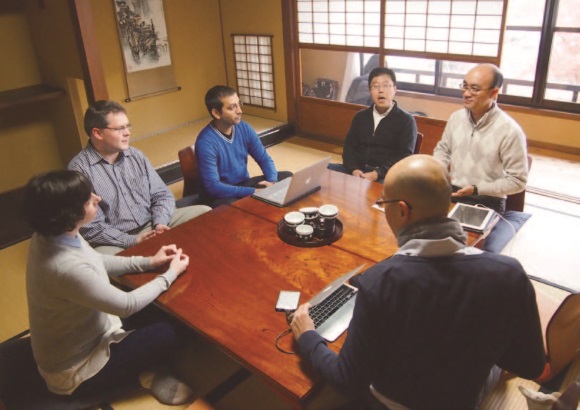シリーズ白眉対談10「Truth」(2016)
登場人物
司会・編集:ニューズレター編集部
登場人物と研究課題
Bill Mak Program-specific Associate Professor, “Historical transmission of India astral science in East and Southeast Asia”
Hemant Poudyal Program-specific Assistant Professor, “Role of gut homones in type-2 diabetes and cardiovascular disease”
Marcus Christian Program-specific Assistant Professor, “Modified general relativity and gravitational lensing tests”
Jennifer Coates Program- specific Assistant Professor, “Re-writing History: Women and War Memory in Japanese Film 1945-1979”
Toshihiro Higuchi Program-specific Assistant Professor, “The making of a “global environmental crisis”: International politics on radioactive fallout nuclear weapons testing, 1945-63”
Kiyokazu Okita Program- specific Assistant Professor, “God as Paramour: Ethic and Aesthetic of Emotion in Early Modern South Asia”

Poudyal, Coates, Christian (from left to right in the rear row)
Truth
(Mak) My name is Bill Mak, associate professor at the Institute for Research in Humanities here at Kyoto University. My field is history of science, focusing on historical Indian and Chinese astronomy. I will be the moderator for today’s dialogue. Should we introduce ourselves?
(Poudyal) I am Hemant Poudyal, biomedical scientist. My research interests include heart diseases and their risk factors such as diabetes.
(Christian) My name is Marcus Christian. I’m a theoretical astrophysicist working at the Yukawa Institute. I’m interested in the fundamental theory of gravity and space time.
(Coates) My name is Jennifer Coates. I work on alternative cinema histories, mostly from the perspective of oral history.
(Higuchi) I’m Toshihiro Higuchi. I’m assistant professor of the Graduate School of Law. My research is in the field of environmental history. I’m working on the beginning of the global environmental age since the mid 20th century.
(Okita) My name is Kiyokazu Okita, assistant professor at the faculty letters, department of Indological Studies. In terms of my research interest, I mainly look at the South Asian religions. I’m interested in how emotion is discussed in religious contexts, especially poetry and drama.
(Mak) Welc ome, ever yone! Some months ago at a meeting, we came up with this topic of truth. The idea is that researchers from science and humanities had a very different understanding of truth as well as the ways to convey it. So I have invited you all today to look at the various challenges we face in our pursuit of knowledge in our respective fields. Perhaps we can enlighten each other with our experiences.
To start with, let me pose a very simple question. How do we know something is true? As we all generate a lot of information on a daily basis, obviously we want to tell the world what we believe to be true.
(Christian) In science, one relies on experiment and observation as the arbiter of any theory. While other factors may play a certain role in shaping these theories initially, they must ultimately stand up in that test.
(Okita) I think the scientific approach is to look for something universal. A scientific truth is not partial to anyone. It is verifiable to everyone. This is the theory, and this is the evidence. If you are doubtful, you can do your own experiment and prove it. But for humanities, the truth is very much dependent on perspective, and depending on which context and in which period.
(Poudyal) It’s the same with medical science. It’s really a matter of perspective. Also, some of it may be geographically influenced; for example, the definition of diabetes in Japan and in the US is very different.
(Mak) But the perspective does not change the facts about the disease. Why do you need to define it in the first place? A disease is just the way it is, right?
(Poudyal) Not always. There are cultural aspects to diseases that you need to consider. There are the nature-nurture aspects. Particularly with Japan, there is a different definition or cause for every disease. There has also been some historical influence, I would say.
(Mak) If the def inition of a certain disease is different, does that affect the way a researcher approaches or conducts the research? And what kind of consequence does that have?
(Poudyal) I think the treatment and possibly knowledge is very local. For example, for diabetes you have different regulatory bodies in America and Japan, and they have their own framework and guidelines.
(Christian) In the physical sciences, too. There is the issue of authority, particularly if the subject is driven by theory, rather than by observations.

(Mak) How does authority affect the ways scientists present their theories?
(Christian) In theoretical physics, it does actually matter when a senior professor has a certain opinion. You can’t disprove him or her in an easy way, because there’s no observational evidence. People might prefer an idea based essentially on principles, like symmetry, mathematical beauty.
(Mak) It’s rather interesting to look at these subjective factors beneath the hard surface of objectivity. In humanities, too, there can also be a spirit of science in the sense that good researchers always make the distinction between what they believe to be the facts and what is recognized to be their own, and possibly fallible interpretation. But lets go back to this topic of authority. It does seem to suggest some people’s truths are more valuable than others’.
(Okit a) In the South Asian tradition, truth is like beauty, which is in the eyes of the beholder. There is a strong sense of qualification. You can perceive certain things only if you have gone through certain training. Therefore, maybe certain information, or a certain under standing of reality is not necessarily available to everyone. That seems to be applicable to modern science in many ways, too. Like when you talk about physics, and laws of astronomy …
(Christian) It’s a privileged discourse.
(Okita) Exactly. Once you pull out these exotic mathematical equations… It’s a language understandable only to the privileged few.
(Mak) I think issues such as trust and authority are pertinent here since not everyone has the access to knowledge or the means to evaluate what they are told. As a result, there is sometimes conflict, such as those between the church and science. As late as the 1950s, the Catholic church still found it necessary to make statements such as their approval of evolution and the big bang theory as not in contradiction to God’s teaching. What kind of role does authority play in your field?
(Higuchi) I think the authority depends on the maturity of the field. In my field, namely, environmental history, there is not really an established authority at all because it is very young. Almost no one started their careers as environmental historians. Everyone comes from a different background and it feels somewhat egalitarian. As a junior faculty member, I can say something to some senior scholars because we are so eager to learn from each other.
(Christian) For scientists, the hierarchy is typically very low. It’s quite common to approach a senior professor and ask any question. But I suppose there might be more deference in the humanities.
(Coates) I think when you’re talking about history, the authority of the hierarchy of the academy is one problem. But the authority of the source, or what counts as a source, is another problem. Because the people whose testimony and memory I work with, are not considered authorities. Truth in the humanities, since the 60’s, has been a bad word.(Laughs) Since post-structuralism, we’re not supposed to believe in truth. There’s not supposed to be one truth.
(Mak) In recognizing that there are many truths, there is also the idea of accommodation and to be inclusive. Does that always lead to a desirable result?
(Higuchi) As Jennifer(Coates) said, since the 1960’s, historians are more aware of our mission. It is to empower people. Back in the 19th century, historical studies were all about nations, and not humans. Now we try to go back in history and recover those people who had been erased from history. Diversity is the key, and we give voice to the underprivileged and the dispossessed so that they become someone, something. But it’s not really the truth per se.
(Mak) In the case of textual studies, there used to be a tendency to see a piece of writing as a monolithic piece of work. But post-modern scholars interpret ideas and authorial intention in a much more nuanced way. I believe this is a major leap in understanding. Instead of looking obsessively for an ultimate interpretation of anything, one tries to reveal the dynamics of different forces at play, the many voices of many characters, even from those hidden behind the scenes.
(Higuchi) It’s like Rashomon (Kurosawa Akira, 1950). It is a challenge to the narrator. I feel a little uneasy about the earlier thought of recovering stories from the dispossessed because the narrative tends to side with them exclusively.
(Mak) So there are power issues involved and instead of presenting the historical picture in its entirety, you would focus only on a certain aspect.
(Higuchi) It is a partisan discourse, for a good cause and for good reason. That is how the earlier historians looked at the important role that black Americans played in the American revolution. That completely rewrote American history and how we understand it.
(Mak) So, to balance out the playing field.
(Higuchi) Right. But once we move beyond that kind of balancing stage and to show the complex interactions among those people, some people would accuse someone like me, of giving undue voice to the manipulators.(Laughs) It is difficult. There’s always ethics involved.
